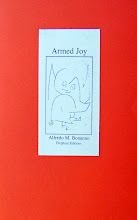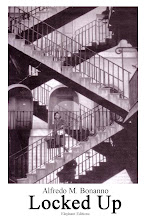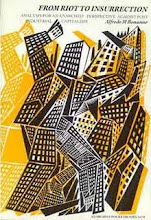No single part of physical space can be isolated from the interference of capital, be it outer space or the ocean depths, mountains or rivers, seas or deserts, the great metropoli or the tiniest, most out-of-the-way village. A whole series of relationships intersect and overlap: seemingly unrelated elements are linked by the common matrix of exploitation. One might try to deceive oneself by going somewhere far away, out of this world as they say, only to discover that the mechanisms of capital still reach us and function perfectly. That explains why we are against ecologism, just as we are against any other ‘alternative’ proposal that claims to do something against exploitation by isolating one part of reality from the rest. Of course, we also start off from specific points in our interventions, but we do not fool ourselves that we can really attack the enemy by remaining within that ‘part’. In order to move to attack we must overcome the fragmentation which at a certain point becomes a necessary choice, but is essentially a strategy that has been imposed on us by capital.
Now, the most serious pillage carried out by exploitation, the one laden with the greatest consequences, is the theft of time and space. These two thefts are substantially linked. Capital steals our time by obliging us to work and by conditioning our lives, infesting them with clocks, commitments, deadlines and so on, right down to the smallest detail. By stealing our time it prevents us from understanding ourselves. It alienates us. Without time we would not even notice the theft of space. We need time in order to become aware of the very presence of space. To think, to listen, to dream, to desire. By living space in terms of distance, kilometres to be covered, moving from one place to another, we lose sight of our relationship with things, nature, the world.
Capital stole time from us (it needed it for production)—then came the system of control and repression, and, finally, the generalisation of consensus. Now we are faced with the need to move to the appropriation of our time and space. Our attack cannot fail to cause damage and ruin. That is in the logic of things, the logic of the class war. The project of power is global. It cannot permit the existence of ‘empty spaces’. Our project of liberation is also global, for the opposite reason. It cannot allow ‘free spaces’ not to exist. If we were to allow capital to achieve global domination, we would be dead for good.
Fortunately the road power will need to cover in order to reach globalization is still a long one. As well as embezzling space (and time) at a global level, capital is beginning to divide reality into two separate parts. It is no longer a question of the old fragmentation but of a net division, a real wall, between included and excluded. The first will be guaranteed a condition of privilege, domination, high cultural levels, projectuality and creativity; the second, a condition of survival, consensus, subcultures, supine acceptance, lack of stimulation and perhaps even of needs. In this perspective capital and the State require complete availability of social space. Nothing must escape their control.
And that is not all. Capital now has technologies at its disposal that allow it not so much the possession of space as its actual production. Think of its capacity to communicate in ‘real time’ between two distinct points thousands of kilometres apart. That does not only change the productive order (variety, creativity, stocks, etc.) but also, and principally, the human order of social relations (which are also economic).
So capital is actually producing space on the basis of its project of exploitation and domination. It is transforming and destroying nature, modifying cities and the land, destroying seas, rivers and lakes, submitting stellar distances to its militaristic logic. The space produced in this way then serves to channel individuals. So we find ourselves in huge traffic jams, speeding along motorways, standing in queues in the supermarket. We are afflicted with traffic chaos, appointments we must not miss, fictitious interests that make us feel bad, obliging us to be continuously and senselessly on the move. We move in spaces that have been programmed for us but which we imagine we have ‘chosen’ ourselves. Our houses are full of useless harmful objects. Space has become restricted or rather has changed according to the needs of capitalist production which needs to sell television sets, fridges, washing machines, furniture and built-in kitchens.
So, almost without noticing it, our time is disappearing and our space is reducing itself to relationships with objects that bear witness to capital’s power to convince. In this way we are being educated to repetition. We carry out the same gestures, as everyone knows (but systematically forgets), in the anteroom to consensus.
For its part capital is obliged to take space from us because it cannot leave any available for our creativity, our capacity for tinkering with things, our desire for innovation (which is the first stimulus to finding solutions that turn out to be incredible endowments of spontaneity and wealth). If capital were to leave space to such individual forces it would not be able to reach the pace of repetition that is indispensable to production. The latter, we must not forget, is only such on the condition that it is also reproduction. Think of the efforts (helped by electronic technique) that capital is making to realise everyone’s desires with the maximum (centralised and codified) diversification. The big names in fashion, the fast food chains, the advertising that highlights individual taste within mass production, are no more than attempts to block various roads that might still be travelled today.
Although the space that is produced and reproduced is based on consensus, it contains a considerable amount of purely repressive aspects, in the policing sense of the term. Control regulates movement in every way. Raw materials and men, ideas and machines, money and desires. Everything is coordinated because everything has been preventively homogenised. Differences are no more than that, they are not radical diversities. They have been reduced to the rank of appearances and in this new capacity are praised to the heavens as the reign of freedom.
So the strategy of power is therefore that of controlling ‘all’ space in the same way as it controls ‘all’ time. It is not just a question of police control, but mainly of control based on consensus and the acceptance of models of behaviour and scales of values that are those of the capitalist technocrats.
What to do? Go in search of lost time? Lost space?
Not in the sense of a nostalgic journey, of going back in time. Nothing in life goes backwards, just as nothing presents itself again in an identical (or in an absolutely different) way.
The old relationship with space left the sign of a physical place. The sign of man and his things. A road, a square, a country crossroads, a river, the sea and the sky, woods and mountains, were in open discourse with the individuals who knew how (and wanted) to listen to them. And affinity with other individuals led men to the same places, animated their feelings, spurred them to action and reflection. One found oneself as an individual, whereas one now hides as part of a whole, of a crowd. Once we were open, also often unprepared and vulnerable. Now we are all protected by uniformity, repetitiveness. We feel more secure because we belong to the flock. Everything is being produced and reproduced. Everything is about to become a commodity.
In this perspective the struggle for social space becomes a struggle for the reappropriation of all ‘territory’ beyond and against the rules of control and consensus.
[Original title: Spazio e capitale, in “Anarchismo”, no. 56, 1987. English translation by Jean Weir published in "Let's destroy work, let's destroy economy", Elephant Editions, London.]
skip to main |
skip to sidebar

Some writings of Alfredo Maria Bonanno in English, or almost

Alfredo Bonanno was arrested on October 1st 2009 in Greece, accused of concourse in robbery. With him, anarchist comrade Christos Stratigopoulos.
Here are a few translations and part translations of a small portion of Alfredo's writing. This is a work in progress, many of the translations are as yet incomplete. Open links to find more of Alfredo's work.
Alfredo Bonnano Released
Nov. 22 Alfredo Bonnano was sentenced to 4 years imprisonment (which practically means that with the time served so far and the fact that he is over 70years old HE IS RELEASED
Christos Stratigopoulos (who took responsibility for the action)
was sentenced to 8 years and 9 months with the Greek law will probably be released at the end 2011
BY ANY MEANS NECESSARY
LINKS
click on any of these labels to read text
- "Community" sickness
- 1981 - Editorial
- A Critique of Syndicalist Methods
- A few notes on Sacco and Vanzetti
- A few notes on the revolutionary movement in Italy
- A little man in Singapore
- A million jobs
- A question of class
- Affinity
- After Marx autonomy
- Albania Laboratory of Subversion (Introduction)
- Anarchism and the national liberation struggle
- Anarchists and action
- AND WE WILL ALWAYS BE READY TO STORM THE HEAVENS AGAIN (Against amnesty)
- ANTI-INSTITUTIONAL MOVEMENT
- Are we modern?
- Armed Joy
- ARMED STRUGGLE. SOME REFLECTIONS.
- Autonomous base nuclei
- beyond syndicalism
- Beyond workerism
- But what is the imaginary?
- Class War
- Comiso - Organizational document of the self-managed leagues
- Considerations on illegality
- Dissonances (Introduction)
- Elephant Editions 1986
- Excluded and included
- Farewell to claiming
- Feral Revolution (Introduction)
- FICTITIOUS MOVEMENT AND REAL MOVEMENT
- For an Antiauthoritarian Insurrectionist International - Proposal for a debate
- From riot to insurrection
- From the centre to the periphery
- Good technology
- Guerilla Extraordinary
- Habits and idols
- Hegel
- I know who killed chief superintendent Luigi Calabresi
- Illegality
- Illness and capital
- Informal organisation
- Insurrection
- Internationalism
- Introduction to Sabate
- Introduction to Anarchism and Violence
- Introduction to Bratach Dubh English edition of Malatesta's Fra Contadini
- Introduction to Insurrectionalist Anarchism
- Introduction to Strange Victories
- Introduction to The Conquest of Bread
- Involuntary aspects of voluntary work
- Let's destroy work
- LET'S DESTROY WORK. New introduction
- Let's keep our feet on the ground please
- Lightening Conductors and Stand-ins - more shots of non-news
- Lightning Conductors and Stand-ins
- Lightning Conductors and Stand-ins (cont.)
- Locked up
- Looking forward to self-management
- Loss of language
- More on internationalism
- National Liberation Struggle
- nineteen years on
- No more crises
- Non-news about drugs
- Non-news about racism
- Ode to the Uniform
- On Feminism
- One's life on the line
- Order and chaos
- Otto Ruhle (Introductory Note)
- OUR ROLE IN THE PRESENT CONFLICT
- Palestine mon amour
- Pantagruel anarchist review
- Pinelli
- Prison and Prisoners’ Struggles - Introduction
- Propulsive Utopia
- Quality and the factory
- Restructuring Capital and the new democracy
- Revolution - Violence - Antiauthoritarianism
- REVOLUTIONARY VIOLENCE
- Science and the social revolution
- Self-management
- Severino Di Giovanni in Argentina 1923-1931 by Osvaldo Bayer
- Social banditry
- SOME NOTES -
- Space and Capital
- Stirner
- Stop the City? From information to attack
- Strategy and Methods
- Streamlined production
- The "end" of the crisis
- The aesthetics of anarchism
- The anarchist tension
- The area of autonomy and the anarchist movement in Italy
- The armed wing of science
- The Cruise missile base at Comiso can be prevented
- The ethical bank
- The insurrectional project
- THE LANGUAGE OF TECNICS -
- The logic of insurrection
- The moral split
- THE NECESSARY DESTRUCTION -
- The priority of practice
- The refusal of arms
- The revolutionary project
- The revolutionary struggle
- The significance of an insignificant event
- The struggle for self-managed social space
- The tyranny of weakness
- The whole and the part
- The young in a post industrial society
- Theory and action
- Towards anarchist antimilitarism
- TOWARDS THE GENERALISATION OF ARMED STRUGGLE
- TRANSFORMATION IN THE WORLD OF WORK AND SCHOOL -
- TRUTH -
- Unemployment in Italy - How come everything doesn't explode?
- Untitled
- Violence and non-violence
- What are anarchists
- What can we do with anti-fascism?
- Why a vanguard?
- Why Insurrection
- World domination in a few words











